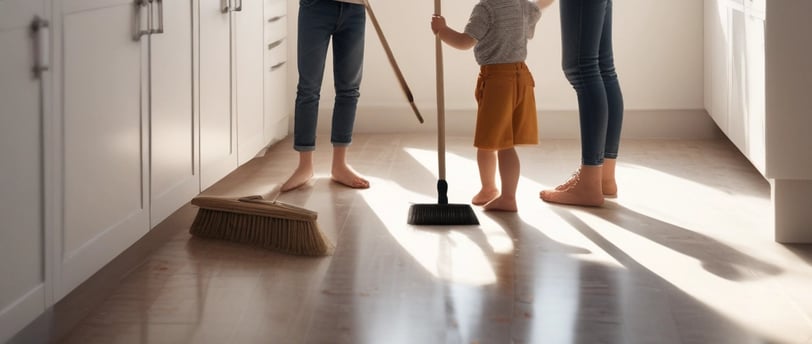How to Make Cleaning Fun—and a Habit Your Children Will Keep
HOME
7/5/20252 min read


If getting your kids to help clean feels like pulling teeth, you’re not alone. But here’s the good news: with the right approach, cleaning can actually be fun and teach lifelong habits.
Children who learn to help with chores early on are more likely to grow into responsible, organized adults. Even better, when you make cleaning enjoyable, they’re less likely to see it as punishment and more as a normal, helpful part of life.
Here’s how to make cleaning both fun and a habit your kids will keep:
1. Make It a Game
Kids love to play—so turn chores into playful challenges!
Beat the timer: Set a timer for 5 or 10 minutes and see how much they can pick up before it buzzes.
Sorting race: Who can sort the laundry fastest by color?
Treasure hunt: Hide small stickers or coins to find while tidying up.
Turning cleaning into a game transforms “boring work” into an exciting mission.
2. Play Music and Dance
Nothing energizes a cleaning session like good music. Make a special “clean-up playlist” of your kids’ favorite songs. Dance and sing while you work together.
Music lightens the mood and makes chores feel less like, well, chores.
3. Offer Age-Appropriate Tasks
Children are more likely to cooperate when they feel confident and capable. Give them tasks they can truly handle:
Ages 3–5: Put toys in bins, wipe low tables with a damp cloth, match socks.
Ages 6–8: Make the bed, sweep small areas, fold towels.
Ages 9–12: Vacuum, load/unload the dishwasher, clean the bathroom sink.
When kids feel successful, they’re proud to help and more willing to do it again.
4. Work Together
Cleaning shouldn’t feel like punishment while everyone else relaxes. Join in and show them you’re part of the team.
Young children especially love “helping” adults. Modeling the behavior you want them to adopt is one of the most effective ways to teach them.
5. Use Positive Reinforcement
Praise works wonders. Tell them you appreciate their help. Say things like:
“You did such a great job making your bed!”
“Wow, look how clean the floor is now!”
Small rewards, like stickers or extra bedtime stories, can also motivate younger kids. Just make sure praise doesn’t turn into bribery every time—it’s about celebrating effort and building intrinsic motivation.
6. Establish Routine and Consistency
Cleaning should become part of daily life, not a special event when the house is a mess.
Have a daily “5-minute tidy-up” before dinner or bedtime.
Create a simple chore chart.
Make certain chores part of the morning or evening routine.
Consistency helps kids understand that cleaning isn’t optional—it’s just something everyone does.
7. Teach the “Why”
Even young kids can understand simple reasons for cleaning:
“We clean so we don’t trip over toys.”
“We wash dishes so we have clean ones to eat on.”
“We wipe counters to keep bugs away.”
Explaining the purpose behind chores helps kids see it as meaningful work rather than a punishment.
8. Celebrate Success
When a big cleaning task is done, celebrate it!
Admire the clean space together.
Take a photo of a super tidy room.
Enjoy a fun activity afterward as a family reward.
This positive association helps reinforce the idea that cleaning leads to good things.
Explore
Discover products and tips for new families.
Support
© 2025. All rights reserved.
